
8,000
in-person visits to the Library’s branches

357,900
visitors welcomed on tours
of Centre Block and historic rooms of East Block

2,700,000
search sessions on the Canadian Parliamentary Historical Resources portal

34,600
inquiries about Parliament from the public

55,000
e-journals made available
to Library users

11,900
requests for information
and reference services
from parliamentarians
and their staff

5,600
requests for research
and analysis from parliamentarians
and their staff
The Library’s operating environment is always shifting. To ensure that we can respond to changes both known and unforeseeable, the Library develops strategic plans that we continually update in response to our operating environment.
In July 2017, we released our new strategic plan, Strategic Outlook 2017–2022. The plan sets out the three priorities – relevance, agility and a healthy workplace – that will steer our improvement activities to 2022.
The Library faces many challenges and opportunities in the years ahead, in particular related to the closure of Centre Block. The decade-long rehabilitation will continue to drive our strategy to ensure that we remain truly relevant to all our users.
As the Library provides service to busy professionals, it is our duty to ensure that the right products and services are available to parliamentarians and the public in formats they can readily access and use.
Our strategic plan calls on the Library to respond to the increasing volume and complexity of requests for parliamentary research, reference and analysis, and to use innovative technologies to improve the user experience in an increasingly mobile work environment.
The Library is committed to ensuring continuity of service throughout the lengthy rehabilitation of Centre Block, which will begin in late 2018.
Because the Library’s main branch is located so near the work planned during the Centre Block rehabilitation, it too will close for the duration. Building on ongoing efforts to modernize our in-person reference service, the Library has an opportunity with the closure to revitalize how we deliver services to Parliament and the public, and to ensure that we are ready and equipped to serve users throughout the closure.
In 2017–2018, we made significant progress in modernizing existing spaces and developing new points of service. Our work will ensure a smooth transition and minimal disruptions.
In 2017–2018, the Library started the renovation of two existing branches, at 125 Sparks Street and the Confederation Building, both of which reopened in the fall of 2018. The renovated branches feature modern work environments with connectivity, workspaces for private study or collaboration, and various options for staying informed of news and current affairs.
We also worked closely with Public Services and Procurement Canada, the Senate and the House of Commons to design two new branches, one in the Senate of Canada Building and the other in West Block. This is in addition to the opening in January 2017 of our Wellington Branch, for a total of five Library branches following the closure of Centre Block.
To better serve parliamentarians and the public, we are relocating the Main Library’s collections among several branches, with the bulk of the collections to be transferred to our facility at 45 Sacré‑Coeur Boulevard in Gatineau, Quebec. As the Library prepares the Gatineau space, we will also prepare for an increase in demand for digital content by augmenting the Library’s ability to scan printed documents stored at that location.
The Library administers a number of visitor services and public education programs. All will be affected by the closure of Centre Block, and this has provided the Library with an opportunity to redesign them.
In 2017–2018, we continued to realign and reconfigure our programming so that the public can connect with Parliament, both on-site and across multiple online platforms, as construction unfolds. The Library is planning guided tours at the new Senate and House of Commons, to be located in the Senate of Canada Building and West Block respectively. A new Visitor Welcome Centre will serve the public on Parliament Hill, and a new reservation and ticketing system will make the reservation of tickets simpler for visitors.
We also continued to work with partners, including the National Film Board, to develop a virtual experience that will use immersive technology to showcase Centre Block’s and Parliament’s art, architecture, people and functions during the period of rehabilitation. The initial phase is set to open in 2019.
The Library was provided with an ongoing $4 million increase in resources in 2017–2018 to strengthen our capacity to meet rising demand and increasingly complex requests from committees, associations and parliamentarians.
We focused our efforts on four emerging areas of interest for parliamentarians – gender-based analysis, international affairs, committee-related communications and visual elements – hiring experts and training research staff in these four fields, as well as hiring additional staff to support analysts and librarians as they carry out their complex work.
One example of our successful use of the new resources was Gender-based Analysis Plus in Canada, a publication we produced before Canada’s sixth annual Gender-based Analysis Plus (GBA+) Awareness Week. This publication demonstrates the Library’s commitment to strengthening our capacity to deliver GBA+ to parliamentary clients.
A particular focus for 2017–2018 was the Library’s work to increase the production of visual elements that make our products easier to absorb.
PARLINFO is the Library’s repository of information on the people and events that have shaped Parliament since 1867. In November 2017 (the 150th anniversary of Parliament’s first meeting), we launched a renewed PARLINFO that includes a complete redesign of the database, modernized with an open-data approach and made more user-friendly. The redesign also ensures the long-term preservation of this historical information, and reduces the effort required to support and maintain the database.
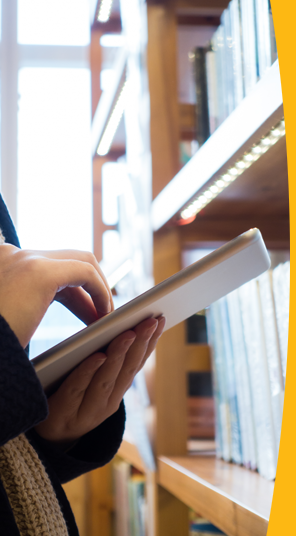
In 2016–2017, the Library began a multi-year renewal of 9,800 pages of content on the Parliament of Canada website with the goal of providing the public with modern, mobile-friendly, streamlined access to information.
In May 2017, the Library released the first top-level pages as part of the initial phase of the project. The Library’s renewed web presence provides a better user experience, easier navigation of Library material and better alignment with Senate and House of Commons content.
The second phase of this project was on track for completion by fall 2018. It includes new and revamped content – including such popular items as historical information about Parliament, visitor information and filters for research publications – that will make it easier to access the Library’s products and services.
In addition to responding to change, the Library must also anticipate it. As an agile organization, the Library works closely with its partners to foster innovation that provides the best possible service for parliamentarians and the public.
In 2017–2018, the Library improved its resources management systems and tools so that we can respond with agility to the changes coming during the closure of Centre Block.
The Library revamped its system for managing core business processes to promote more vigorous stewardship of resources, better management of risk and more open reporting of organizational results – including human resources and financial. The new system was launched successfully on April 1, 2018. The Library continues to configure, test and transition to a fully integrated solution that will enable our decision-makers to communicate more effectively and make the best, most agile business choices – ultimately leading to better service for parliamentarians and the public.
A competency framework is a model that broadly sets out the blueprint for successful job performance within an organization by defining the desired behaviours and proficiency levels expected for every job description. The Library renewed its competency framework in 2017–2018, pinpointing client service, adaptability and exemplification of integrity as core competencies for all employees. This will support a more agile organization and aid in succession planning.
The Library also trained employees in four emerging priority areas, including gender-based analysis plus (GBA+). The extensive and wide-ranging training will further enable employees to meet requests from parliamentarians.
In June 2017, Parliament passed legislation establishing the Office of the Parliamentary Budget Officer (OPBO) as a separate organization that reports directly to Parliament rather than to the Library. The separation became effective in September 2017.
Through the provision of various planning, strategic and operational services, the Library contributed to the successful transition of the OPBO as an independent agent of Parliament. The Library and the OPBO also entered into multiple service agreements for the ongoing provision of services once the OPBO became independent.
Our records management group assisted with the transition of the OPBO out of the Library’s operations by recommending appropriate custodianship of records following the transition. The recommendations balanced the integrity of the Library’s archives with the operational needs of the new OPBO.
While, according to its mandate, the OPBO provides economic and financial analyses, including the new element of costing election campaign proposals, the Library continues to support parliamentarians with non-partisan economic and financial analysis on a custom, confidential basis and through relevant publications. The Library also supports parliamentary committees through the work of committee analysts, whose economic and financial analysis work includes support for committee review of government estimates, in particular.
A healthy workforce is essential to achieving the ambitious priorities of the Library’s new strategic plan. To remain relevant, and to do so with agility, requires that employees engage in thoughtful risk-taking and remain open to learn from successes and failures.
In 2017–2018, the Library continued to build on several years of work to promote a safe and healthy workplace. We focused on recruiting a workforce capable of providing excellent service in an ever-evolving technological and knowledge-based environment and placed a particular emphasis on promoting mental health.
In keeping with our healthy workplace priority, the Library developed a cohesive, organization-wide healthy workplace strategy with the goal of permanently shifting the Library’s culture toward one of sustainable workplace health.
The Library administered its first healthy workplace survey, sharing the results with employees and identifying initiatives to address specific issues. Results suggested that the Library is good at engaging employees, but that attention is needed in the two areas of clear leadership and expectations, and respect and civility.
In response to the survey results, the Library provided training for managers and employees to help them to be better equipped to support a healthy workplace and to feel more comfortable doing so. We also expanded our harassment-prevention training, offering to address specific needs identified by employees and managers.
Harassment prevention and harassment complaint-resolution became more significant for the Library in 2017–2018. The Library’s general counsel and human resources division reviewed Bill C-65, An Act to amend the Canada Labour Code (harassment and violence), the Parliamentary Employment and Staff Relations Act and the Budget Implementation Act, 2017, No. 1, to assess the potential impacts on and risks for the Library of the new statutory obligations should they come into effect. Harassment-prevention training increased, and the Library reached out to its partners on Parliament Hill to address issues among their respective employees.
The Library also worked closely with other parliamentary organizations to hear and resolve complaints involving Library employees. In all cases, the organizations took appropriate actions. The Library continues to improve its ability to prevent and address harassment in the workplace.
Key to the Library’s strategic plan is an emerging diversity policy, drafted in 2018 and open for consultation through mid- and late 2018, that would promote an inclusive culture in the workplace and contribute to eliminating discrimination in all aspects of employment – from recruitment to retention. The new policy would aim to enable all employees to participate in and contribute to the Library’s operations to their full potential. It would also guide the Library in complying with the Canadian Human Rights Act, which prohibits discrimination.

During 2017–2018, the Library rolled out the new Employee and Family Assistance Program – a voluntary, confidential, short-term counselling service that connects individuals and their immediate family members to a network of counsellors, psychologists, social workers and experts available to provide assistance 24 hours a day.
The Library’s continuous improvement activities are rooted in the service we provide to parliamentarians and the public. Our employees work to ensure that all Library information – whether customized research for legislators, curated information, or classroom materials for teachers – is reliable, impartial and tailored to the needs of our clients.
In 2017–2018, the Library experienced high demand for its services as parliamentarians routinely turned to us with their requests. The Library supports parliamentarians either individually or as members of parliamentary committees, associations and delegations, providing non-partisan information, reference, research and analysis on important issues, or helping them find documents or check facts online, over the phone or in person.
| User Group | Information and Reference1 | Research and Analysis2 |
|---|---|---|
| Parliamentarians and their staff (including constituency staff) |
11,550 | 1,338 |
|
Senators
|
1,808 | 319 |
|
Members of the House of Commons
|
9,742 | 1,019 |
| Parliamentary committees, associations and delegations |
366 | 4,259 |
|
Senate committees
|
76 | 602 |
|
House of Commons committees
|
174 | 1,246 |
|
Standing Joint Committee for the Scrutiny of Regulations
|
0 | 1,8113 |
|
Associations and delegations
|
116 | 600 |
| Employees of the Senate, the House of Commons and the Library of Parliament | 4,783 | – |
| General public | 34,598 | – |
| Other authorized users4 | 2,835 | 62 |
| Total | 54,132 | 5,659 |
The Library’s research librarians and its information and research technicians support the work of parliamentarians and other authorized users by providing timely, non-partisan responses to a wide range of questions, and curating news and other sources of information. Services include customized information searches, fact checking and consultation of print and electronic publications within the Library collection.
Members of the Library’s information service team reply to questions from the public. Topics range from how to visit Parliament to queries about the role and history of Parliament to requests for public education materials and Sessional Papers. For example, the Library provides more than 2,200 copies of Sessional Papers per year to the public and journalists in addition to those we provide to parliamentarians.
Parliamentarians’ individual and confidential requests are answered by teams of analysts – lawyers, scientists, economists, political and social scientists and other professionals – in the form of customized research papers or in‑person briefings.
The Library’s subject-matter experts provide Senate and House of Commons committees and parliamentary associations with confidential, non-partisan advice, and research and analysis services in a wide range of subject areas.
Library analysts assigned to parliamentary committees were tasked with giving ongoing support by:
The analysts were assigned to more than 50 committees in the Senate and the House of Commons, and to all 13 recognized parliamentary associations. They completed 1,848 research requests for parliamentary committees and 600 for associations and delegations.
Analysts assigned to the Standing Joint Committee for the Scrutiny of Regulations completed 1,811 projects.
The Library assigned analysts to each parliamentary association to provide ongoing support and accompany delegations to international meetings. Analysts and librarians helped by preparing:
In addition to Library staff meeting regularly with parliamentary committee and association chairs, members of the Library’s senior management team completed a series of meetings initiated in 2016–2017 with House of Commons committee chairs to learn what they expect from us now and in the future. These meetings help ensure that parliamentarians understand the services the Library provides, and the role of Library analysts assigned to committees and associations.
The Library also supported the work of the House of Commons Liaison Committee and the Joint Interparliamentary Council and their subcommittees. These bodies each have important responsibilities – mostly related to budgets, funding allocations and administrative issues – that help ensure the proper functioning of parliamentary committees and associations.
The Library produced a wide range of online research publications to provide parliamentarians, parliamentary committees and parliamentary associations with reliable and timely analysis of key issues, legislation and major public policy topics.
Our publications are non-partisan and address current and emerging subjects relevant to parliamentary and constituency work.
22
Legislative Summaries
(not counting pre-release summaries)
Plain-language explanations of the purpose and history of government bills and private members’ bills
20
HillNotes
Concise overviews of current and emerging issues of immediate interest to parliamentarians
21
Background Papers
and In Briefs
In-depth studies on policy issues and short reports on current topics, with links to more substantive sources on the same topic
113
Trade and Investment Series profiles
Information on Canada’s trade relationships with other countries, expanded in 2017–2018 to respond to increased international travel by committees and associations
The Library’s research publication Twitter accounts @LoPResearch and @BdPRecherche help parliamentarians and their staff stay connected with Library research.
In 2017–2018, these Twitter accounts greatly increased their followings. Parliamentarians and the public took particular interest in certain publications, and a number of them retweeted the HillNotes Young Parliamentarians around the World and The National Day of Remembrance and Action on Violence Against Women.
In 2017–2018, the Library expanded its infographics service, producing a high number of visuals – including 239 geographic information system (GIS) maps and many documents containing one or more complex infographic elements – for research publications, research documents and committee reports. One example: the infographic "Prescription Drug Approval and Pricing" in the House of Commons Standing Committee report, Pharmacare Now: Prescription Medicine Coverage for All Canadians ![]() (8.5 MB, 140 pages).
(8.5 MB, 140 pages).

Using GIS mapping, the Library creates interactive, content-rich, easy-to-understand maps. We produce them both for the Library’s research publications and, in response to individual requests, for parliamentary committee and association reports.
GIS mapping has been particularly useful for responding to parliamentarians’ strong interest in international, national, regional, provincial and riding-based information on such diverse subjects as flows of refugees in Africa, World War II ocean graves, wildfires in Canada and agricultural land use.
In 2017–2018, our GIS analysts produced 239 maps for parliamentary clients.
The Library continues to play a central role in keeping parliamentarians and their staff members abreast of current affairs that affect their day-to-day roles and responsibilities.
We offer expert curation of daily news and current affairs, evaluating, gathering and delivering the information and resources that best support parliamentarians’ work. We also provide guidance on how parliamentarians and their staff can self-direct their media-monitoring activities. In 2017–2018, we offered:
We also provided the following news-related services:
The Library made its collection of databases easier to use in 2017–2018 by updating the subject descriptions in our “Databases A–Z” list. “Databases A–Z” is a popular point of access to the various electronic resources to which the Library subscribes. Clients used the tool 35% more in 2017–2018 than in the previous year to find the most relevant resources for their work.
The Library also acquired new databases to increase users’ access to historical material and newsmagazine sources, as well as international legislative and research content.
Subject guides give parliamentarians and their staff access to reliable and authoritative resources on specific subjects. The guides communicate information about the Library’s collections and provide links to books, websites and databases.
The Library creates guides that address topics that parliamentarians most frequently ask about. We updated all subject guides in 2017–2018, ensuring that our users have access to the most current resources, and we reorganized the layout to provide a more intuitive user experience. The result was a 28% increase in consultation sessions over the number in the previous year.
In September 2017, the Library released its new “Data by Geographic Area” tool, providing parliamentarians and staff with a user-friendly online platform to view, organize and export socio-economic and transfer payment information by geographic area (including federal electoral districts) and by department or agency.
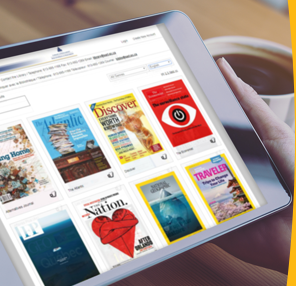
The Library’s users continue to shift to mobile devices in order to access newspapers and magazines. In 2017–2018, users read 170,250 articles using two of the Library’s most popular newspaper and magazine apps, which together provide access to well over 7,000 titles. That amounts to a 20% increase in use over the previous year.
The Library puts considerable resources into developing relevant collections to support the information needs of Parliament. We ensure that our users can access our e-collections as easily as possible wherever they are – in their offices, at home or on the road using mobile devices.
A further function of the Library is the preservation of its collections for future generations. We also ensure access to historical information about Parliament.
The Library implemented a new interface with and added features and enhancements to its catalogue, all of which make accessing resources easier for users. Our team continued to provide detailed reports of Library holdings as we relocate collections ahead of the Centre Block closure, facilitating collection inventories, accurately reflecting locations and supporting more efficient processes.
Our collection-development team developed and disseminated a list of new acquisitions to promote recent additions to the collection. It also began to promote library events on the catalogue home page to keep users and employees informed about them.
In 2017, our collection-development team undertook an in-depth analysis of how the Library collection is used, and the current challenges in maintaining a high-calibre research collection.
As part of this initiative, we launched a new collection advisory group with a mandate to strengthen links among the Library’s internal stakeholders on collection issues. The group will enable a more agile and evidence-based approach to decision-making for collection development.
The Library has secured a larger and more stable budget for developing and digitizing the collection. The funding will enable us to improve service to Parliament by providing new content and increasing content digitization.
The Library continued in 2017–2018 to digitize Sessional Papers, adding nearly 570 to the online catalogue available to parliamentary users. We continued to apply our subject taxonomy to each Sessional Paper, which means that users can subscribe to a subject feed and receive alerts when new papers are catalogued. This functionality also enables the Library to feed new Sessional Papers into its intranet “Browse by Subject” page, further allowing parliamentary users to serve themselves.
Before the explosion of online information, the Library maintained collections of information and news on specific topics of interest to Parliament in a physical format called vertical files. The Library is in the process of digitizing this historical content to make it more readily available to research and reference staff, supporting their access to these files as they undertake research and reference on behalf of parliamentarians and the public. In 2017–2018, vertical files containing the Library’s historical collection of information about the Parliament buildings was digitized and added to the online collection.
Our working group on preservation planning was formed in 2017 and has finalized a list of items – such as historical bills and committee materials – that will undergo mass digitization, making key historical parliamentary content easier to search and preserve. We also began to build the technological capacity for on-demand digitization at our off-site collection storage facility, ensuring that the collection remains readily available to our users.
The Library’s Preservation Laboratory took on multiple special projects in 2017–2018, including restoring significant historical items from our collections, and undertaking protocol projects, such as designing official guest books for the Speakers of the Senate and the House of Commons. The lab delivered more than 1,000 newly preserved items, involving such processes as providing preservation housing (which protects objects as they are being handled), completing treatments to conserve items, and repairing standard library bindings.
The Preservation Laboratory implemented a significant change in its process during 2017–2018, replacing deteriorated leather bindings using a Japanese paper technique. The technique is used selectively and has the advantages of being quicker to apply, less expensive, and longer lasting than leather replacements.
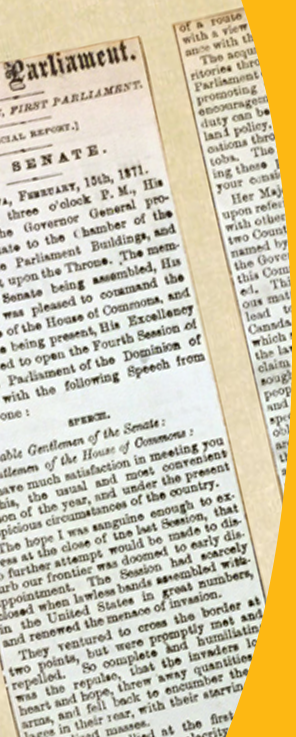
The Library’s “Scrapbook Debates” have been included in UNESCO’s Canada Memory of the World Register. The Scrapbook Debates are a collection of newspaper clippings about Senate and House of Commons proceedings that were published from 1867 to 1871, before Parliament introduced an official record for its debates. They are the only organized source of parliamentary proceedings for that period.
The scrapbooks came into being after Canada’s first Parliament decided that the cost of recording debates word-for-word would be too high. Parliamentarians felt that reports by the Press Gallery would satisfy public demand.
Library staff created the scrapbooks, adding notes in the margins and handwritten partial indexes that give context to the historical data. Although access to the physical scrapbooks has always been limited to Parliament, the Scrapbook Debates have often been consulted and have degraded over the years. They are now individually boxed and preserved in a controlled environment in the Rare Book Room of the Library, while digital versions of their contents can be searched by the public on our Canadian Parliamentary Historical Resources portal.
The Canada Memory of the World Register, which is managed by the Canadian Commission for UNESCO, contributes to the preservation of documentary heritage. Inclusion of the Scrapbook Debates in the registry signifies their importance and promotes their preservation.
The Library’s branches will continue to provide parliamentarians with user-friendly services, as well as comfortable areas for reading and research, after the closure of Centre Block. Our on-site librarians will help parliamentarians and their staff to use our collections and plan their research projects.
To prepare for the closure and rehabilitation of Centre Block, the Library renovated two of its branches – at 125 Sparks Street and at the Confederation Building – both of which reopened in late 2018.
The Library is also working closely with Public Services and Procurement Canada, the Senate and the House of Commons to design two new branches, in the Senate of Canada Building and West Block. This is in addition to the opening of our Wellington Branch in January 2017.
The Library provides high-quality learning opportunities and seminars for parliamentarians and their staff on public policy, legislation and other topics. We also deliver training in person and online to help parliamentarians navigate our services, and to raise their awareness of the range of resources we provide. Attendance was strong in 2017–2018, and we added a number of new training sessions on key areas of interest for users.
In 2017–2018, we focused on recruiting high-profile guests for our seminars and partnered with forward-thinking professional development providers. Attendance at our seminars increased by about 26% over the previous year.
Among our well-known guests was the Right Honourable Kim Campbell – Canada’s only female prime minister. She sat down with the Parliamentary Librarian in October 2017 for one of the Library’s highest-attended seminars ever.
The Library launched a new training program in 2017–2018 aimed at ensuring that parliamentarians and their staff may make optimal use of our information resources.
The Library planned six 30-minute, small-group training sessions, and began to offer them at various branches near the end of 2017–2018. They included such topics as media and news monitoring, how to access information to help constituents, and how to find statistics, reports and research articles.
The Library conducted more than 120 outreach sessions to help orient and train more than 600 parliamentarians and their staff about the Library’s resources and services.
Most sessions involved in-person visits and training, as our users prefer direct contact with Library staff. The most popular sessions focused on general Library products and services. We also delivered detailed training on the new client interface for the Library’s catalogue and on the new employee interface for the Integrated Library System.
The Library also developed new guides for popular Library apps to help parliamentarians get the most value from these tools.
The Library’s information service fields general queries about the Parliament of Canada. In 2017–2018, our staff answered more than 34,500 questions from the public about the role, history and work of Parliament. We also provided access to such documents as Sessional Papers, and directed Canadians to the parliamentary offices and resources they were seeking.
The newly modernized PARLINFO – a historical database about the people, events and institutions that have shaped Parliament – continued to be a high-traffic site in 2017–2018. A redesigned, more user-friendly PARLINFO was launched in November 2017. The new release provides the foundation for the future delivery of historical data about Parliament.
The Library works in partnership with the Canadian Research Knowledge Network and Canadiana – an organization that aims to present Canada’s cultural heritage online in a user-friendly and accessible way – to provide access to Canadian Parliamentary Historical Resources. This portal leads to full-text, searchable Debates and Journals for the Senate and the House of Commons, dating back to 1867.
In 2017–2018, the Library began a mass digitization initiative for parliamentary publications, which we expect will be delivered over the next fiscal year and will augment the collections already available on the portal. Through this initiative, the Library can meet the needs of users by increasing digital access to key historical collections. In 2017–2018, the Canadian Parliamentary Historical Resources portal had 2.7 million browse-and-search sessions, with 888,000 full-text searches and 5.7 million page views. We expect further growth once the new collections have been added.
The Library welcomes visitors to Parliament and educates the public through a variety of services. These include guided tours, educational tools, interactive websites and informative publications aimed at Canadians of all ages.
In 2017–2018, the Library welcomed visitors to Parliament with guided tours of Centre Block and East Block, as well as informal interpretation of the Peace Tower observation deck and Memorial Chamber. We also helped Canadians understand how Parliament works via dedicated web resources and educational products for teachers, youth and the public.
We continued a successful national promotion campaign to increase the public’s awareness and use of Parliament’s resources, products and services. Using Facebook and Google AdWords, we achieved the following results:
5,000
new followers on the Parliament of Canada’s @PARLyouth and @PARLjeunes Facebook pages, operated by the Library, for a total of 30,000
75,000
views on the PARLyouth and PARLjeunes YouTube channels
950,000 and
500,000
views respectively for Our Country, Our Parliament and Discover How Canadians Govern Themselves, two flagship Library resources about Parliament
Centre Block tours: The Library welcomed more than 339,000 visitors to Centre Block on guided tours – the highest number of visitors in five years. This includes more than 61,460 students and teachers who discovered the people, history, functions, art and architecture of Parliament.
Library exhibit tours: To ensure that as many people as possible were able to view a unique exhibit called Foundations: The Words That Shaped Canada in the Library’s main branch, we offered special tours for more than 3,100 visitors.
East Block tours: From July to September 2017, more than 18,900 visitors explored four heritage rooms restored to their appearance in 1872. In June, the Library opened the historic rooms of East Block for guided tours as part of the Doors Open Ottawa 2017 weekend, welcoming another 682 visitors.
Visits to the Peace Tower observation deck and Memorial Chamber: The Library continued to welcome the public in 2017–2018 to visit the Peace Tower observation deck and the Memorial Chamber. Our guides provided free, informal interpretation focused on Canada’s military contributions and the Books of Remembrance, which commemorate those who died in service to Canada. More than 192,000 people visited.
The Parliamentary Boutique: The Library expanded the offerings at the Parliamentary Boutique in 2017–2018. After having introduced a new website for the boutique in 2016–2017, we developed 125 new products this year, increasing sales by 25%.
In anticipation of the closure of Centre Block, the Library installed an interactive exhibit in February 2018 called Landmark Moments: The Stories of Centre Block. The exhibit celebrated the history of this iconic building by highlighting key moments of change, celebration and remembrance that took place within its walls and on its steps. Stories included the laying of the new Peace Tower’s cornerstone by the Prince of Wales in 1919 after Centre Block burned, and the story of Agnes Macphail, the first woman elected to Canada’s Parliament.
The Library developed brochures in 44 languages and dialects for visitors to Parliament to complement its redesigned Welcome to Parliament ![]() (6.5 MB, 9 pages), published in English and French. The brochures are available in Centre Block and online.
(6.5 MB, 9 pages), published in English and French. The brochures are available in Centre Block and online.
Nearly 350 young Canadians applied for the Library’s Parliamentary Guide summer work program in 2017–2018. The program offers bilingual students a chance to work at the centre of Canadian democracy and helps them to perfect their public-speaking and second-language skills.
The Library hired 40 university students from seven provinces to give tours of Centre Block. In addition, nine alumni Parliamentary Guides delivered tours of both East Block and Centre Block.
The 150th anniversary of Confederation coincided with the 21st edition of the Teachers Institute on Canadian Parliamentary Democracy. The Teachers Institute is an intensive professional development opportunity that gives 85 teachers from across Canada an inside view of how Parliament works and enables them to bring their new knowledge to their classrooms.
To mark the occasion, the Teachers Institute heard a keynote address from Sheila Copps, the first woman named to the post of Deputy Prime Minister, and the first to give birth while holding office as a Member of Parliament.
Our Ambassador Program introduces Senators, Members of the House of Commons and their staff to the Library’s products and services.
In 2017–2018, we recruited and trained several ambassadors, who helped our already-active team deliver personalized briefings to parliamentarians and their staff. The ambassadors’ activities included 20 visits to individual parliamentarians and several presentations to groups of Senators and interns about how the Library supports the work of Parliament and how specific Library products and services can assist parliamentarians in their work.
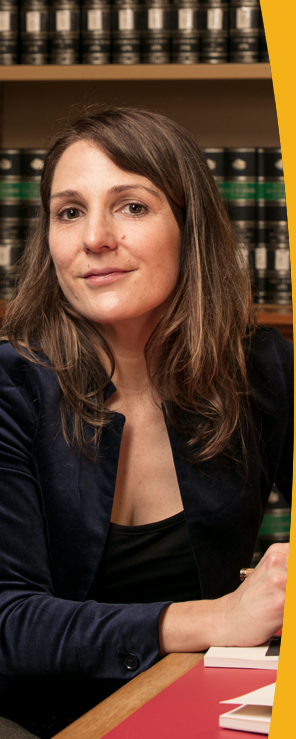
In 2017–2018, the two-year appointment of Parliamentary Poet Laureate George Elliott Clarke ended and the appointment of our new Poet Laureate, Georgette LeBlanc, began.
The Library coordinated the selection process that led to Ms. LeBlanc’s appointment. She is Canada’s eighth Poet Laureate and the second woman to hold the position.
Heavily influenced by her Acadian upbringing, Ms. LeBlanc has written such works as Alma (2007), Amédé (2010), Prudent (2013) – which was a finalist for the 2014 Governor General’s Literary Award for poetry – and, most recently, Le Grand Feu (2016). She has also collaborated on and contributed to several theatrical, visual and musical projects.
Outgoing Poet Laureate George Elliott Clarke concluded his mandate by hosting a well-attended poetry reading in Centre Block and by launching Canada’s first National Poetry Registry. The registry helps connect poets with parliamentarians and the public.
Federal legislators created the Poet Laureate position in 2001 to bring Canadians’ attention to the writing and reading of poetry, and to help communicate the importance of literature, culture and language in Canadian society.
In summer 2017, for the 150th anniversary of Confederation, the Library ran a campaign on its Twitter account and associated web page to celebrate the occasion. Following the campaign, the number of followers for the @LoPInformation account increased by 20% and for the @BdPInformation account by 26%.
In winter 2018, we launched a bilingual Instagram account to communicate with employees, the parliamentary community and the public. The Library is using the account to, among other things, reinforce our role in the rehabilitation projects taking place across the parliamentary precinct. This includes engaging employees regarding ways in which the closure will affect their work. We are reaching more users on Instagram every week.
The Library created a presence on LinkedIn in February 2018, mainly to improve our reach for recruiting new talent. Our LinkedIn page also serves as a channel for the Library to promote publicly available research, services, news and products to Canadians.

The Library marked the 150th anniversary of Canada’s Confederation by launching a number of exhibits and activities:
To provide the best possible service to parliamentarians and the public, Library employees require strong support from the organization. We accomplish this by providing staff and managers with a variety of services from our finance, human resources, information technology, and publication professionals, as well as from the Library’s legal counsel. By coordinating the Library’s processes with those of our counterparts in Parliament, the Library upholds the highest standards of public sector governance.
The Library’s records management and information management functions touch on virtually all aspects of our service delivery. In 2017–2018, we undertook various activities to ensure the careful management of information, including these:
The Library’s Business Support Services team consulted with Library employees in 2017–2018 to learn more about their support needs and their levels of satisfaction with the support they were receiving.
These exercises helped the team to foster a culture of service excellence and innovation. Business Support Services gained a deeper understanding of needs and, as a result, is able to modernize services, functions, processes, policies and delivery models, as well as redirect capacity where it is needed, increasing the Library’s efficiency and effectiveness.

To be Parliament’s preferred and trusted source of information and knowledge.
The Library of Parliament contributes to Canadian parliamentary democracy by creating, managing and delivering authoritative, reliable and relevant information and knowledge for Parliament.
An informed and accessible Parliament.
Vested with the direction and control of the Library of Parliament in accordance with the Parliament of Canada Act
Composed of Senators and of Members of the House of Commons responsible for advising the Speakers on the operations of the Library
Exercises control and management of the Library and has the status of a Deputy Head, reporting to the two Speakers
Provides parliamentarians with news, reference, research and analysis services and oversees the Library’s public education programs and seminars for parliamentarians and their staff
Provides independent analysis to Parliament about the state of the nation’s finances, government estimates and trends in the national economy
Builds, manages, preserves and optimizes access to the Library’s resources and collections; compiles and disseminates historical information about Parliament and parliamentarians; and acts as the steward for the Parliamentary Poet Laureate2
Provides business support and services to the Library of Parliament
The Library of Parliament has five key responsibilities:
1. These numbers can vary from year to year due to Senate or House of Commons seats becoming vacant.
1. Includes special committees and subcommittees other than those focused on agenda and procedure.

| Service | Main Estimates ($) | Supplementary Estimates and Adjustments ($) | Total Authorities ($) | Actual Spending ($) | |
|---|---|---|---|---|---|
| Parliamentary Information and Research Service | |||||
| Research and analysis | 12,940,222 | – | 12,940,222 | 11,426,503 | |
| Reference services | 3,179,693 | 1,300,000 | 4,479,693 | 4,477,676 | |
| Public education programs1 | 3,101,669 | 750,000 | 3,851,669 | 3,839,958 | |
| Parliamentary Budget Office | 2,684,248 | (1,510,379) | 1,173,869 | 1,173,869 | |
| Information and Document Resource Service | 6,669,824 | 570,000 | 7,239,824 | 7,219,905 | |
| Business Support Services | 13,017,561 | 135,000 | 13,152,561 | 12,088,311 | |
| Office of the Parliamentary Librarian2 | 917,039 | – | 917,039 | 885,952 | |
| Employee Benefit Plan | 5,247,241 | (727,303) | 4,519,938 | 4,519,938 | |
| Total | 47,757,497 | 517,318 | 48,274,815 | 45,632,112 | |
View the audited financial statements ![]() (1 MB, 23 pages)
(1 MB, 23 pages)
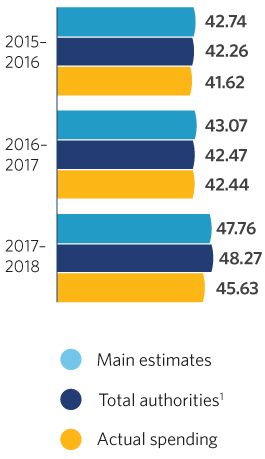
| Fiscal year | Main estimates | Total authorities | Actual spending |
|---|---|---|---|
| 2015–2016 | 42.74 | 42.26 | 41.62 |
| 2016–2017 | 43.07 | 42.47 | 42.44 |
| 2017–2018 | 47.76 | 48.27 | 45.63 |
1. “Total authorities” includes Employee Benefit Plan adjustments.